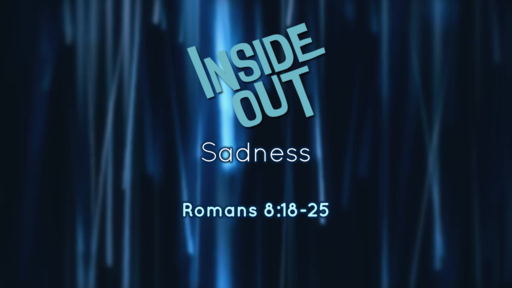Inside Out - Sadness

Sadness and sorrow are inherent features of this fallen world. Romans 8:18-25 captures this. If we cannot feel sadness then we are somehow disconnected from reality. Sadness should motivate us to press into Christ in the hope of the new creation, and to share God's love with all around us. The Inside Out clip mentioned in the sermon can be found at: https://youtu.be/M5pfng5S8tQ
Introduction
Video
Our Experience
Grief in the Scriptures
The concept is found in the Scriptures under a variety of circumstances. Isaac and Rebekah experienced grief when their son Esau married a Hittite woman (Gn 26:35 KJV). God mourned the misery of Israel brought upon them by disobedience (Jgs 10:16 KJV). Hannah was so sad because she had no son that she appeared to be drunk while praying (1 Sm 1:16 KJV). Similarly, Samuel, distraught at King Saul’s disobedience, prayed all night. Job was exceedingly sorrowful over his personal loss (Jb 2:13; cf. 6:2; 16:6), and the psalmist poetically demonstrated distress and sorrow (cf. Pss 6:7; 31:9, 10; 69:26 KJV; 73:21 KJV; 95:10 KJV; 112:10 KJV). The Book of Lamentations is devoted to the expression of grief, and the prophets in general speak of judgment because Israel had grieved a holy God.
Grief, Grieving. Scripture often speaks of God as being grieved or experiencing grief. This holds true for each member of the Trinity. In Genesis 6:6–8 the Father is grieved because of the sinfulness of the human race. The disobedience of Israel and the church grieves the Holy Spirit (Isa. 63:10; Eph. 4:30). The Son of God is a man of sorrows, acquainted with grief (Isa. 53:3–10; Matt. 23:37–39; Luke 13:34–35; John 11:35).
The Bible often expresses the things of God in human form or with human feelings in order to accommodate our limited understanding. Yet with regard to grief and grieving, the Scriptures are not simply explaining a divine action in human terms. Rather, the subject of divine grief addresses the very essence of God as a person and the image of God in all persons. The grief of God testifies to that dynamic, living relationship that exists between God and humankind. Right as Aristotle was in many ways, God is not an “Unmoved Mover.”
